Milanović: Every Citizen Knows Frka Petešić Committed Thievery
ZAGREB, 30 Jan 2022 - President Zoran Milanović on Saturday responded to criticisms from HDZ member of the European Parliament Tomislav Sokol, saying that the prime minister's chief of staff, Zvonimir Frka Petešić, had committed "thievery" and that "every citizen knows that it's dishonesty, greed, plunder."
Sokol said earlier on Saturday that what was happening to Frka Petešić because of the state-owned flat in which he lives in Zagreb was a disgrace.
"We won't run away from the topic so easily by denying reality and switching arguments. That is a criminal offence," Milanović told the press in Sisak. "This is one elaborate impertinent fraud, committed with full awareness of its unlawfulness," he said.
Sokol also said that if anyone thought a crime had been committed, they should report Frka Petešić to the authorities.
Milanović said Frka Petešić should be reported "because there's not a chance that DORH (State Attorney's Office) will do it ex officio."
"Just as it's impossible for DORH to understand that what was happening in the State Assets Ministry was a crime. A whistleblower had to file a criminal report of 37 pages in order to be heard," he added.
The president said he would not report Frka Petešić, but reiterated that he committed a criminal offence and that attempts were being made to portray it "as an oversight."
"It's an elaborate process. Why doesn't he keep his books on Dugi Otok (island) if he lives there?" he said regarding Frka Petešić's claim that he keeps his books in a basement of a warehouse of the Državne Nekretnine state assets management company in Zagreb.
The president recalled that the Državne Nekretnine whistleblower had called out Defence Minister Mario Banožić for protecting one company.
"That company filed for bankruptcy. The state, because someone intervened, did not collect rent and came out the loser. Such favours don't come without a fee because that's a serious favour. If you allowed someone not to pay two or three million in rent, they will probably thank you. The company filed for bankruptcy, the state will get nothing. Who will be held to account?"
The president said that if anyone was embarrassing Croatia, "it's the HDZ."
"Where am I embarrassing it? In Moscow? In Kyiv? In Berlin? But yes, I surely get on some people's nerves. Yesterday I was America's man, today I'm Russia's man, but somehow I believe I'm Croatia's man."
Asked to comment on Zagreb Jewish Community head Ognjen Kraus's statement that he has still not met with Prime Minister Andrej Plenković about banning Ustasha insignia, although a meeting was promised. Milanović said Plenković was stalling Kraus again.
"He'll trick him again. The law won't be changed. Unfortunately, Kraus won't get anything," he added.
For more, check out our politics section.
Sports Culture in Slavonia: How One Tournament Became a Way of Life
30 January 2022 - Croatia, in comparison to other countries in Europe, is relatively small. However, what’s really beautiful about it is the diversity of every single region in terms of tradition, culture, the mentality of the people, and more. Sport fits that narrative as well. This is a story of how small Slavonian villages lived and still live through sports during summer. A look at sports culture in Slavonia.
When it comes to summer in Croatia, most of the residents in Vukovar - Srijem County think about how can they “escape” the unbearable Slavonian heat and relax on the beautiful Adriatic coast with no obligation to anything. Unfortunately, people who are unable to afford the trip to the coast stay in and brainstorm what to do to “kill” time. Summer sports events became one of them and stayed relevant even today. The main question is, when did this all start? How have these tournaments become so integral for residents of small Slavonian communities?
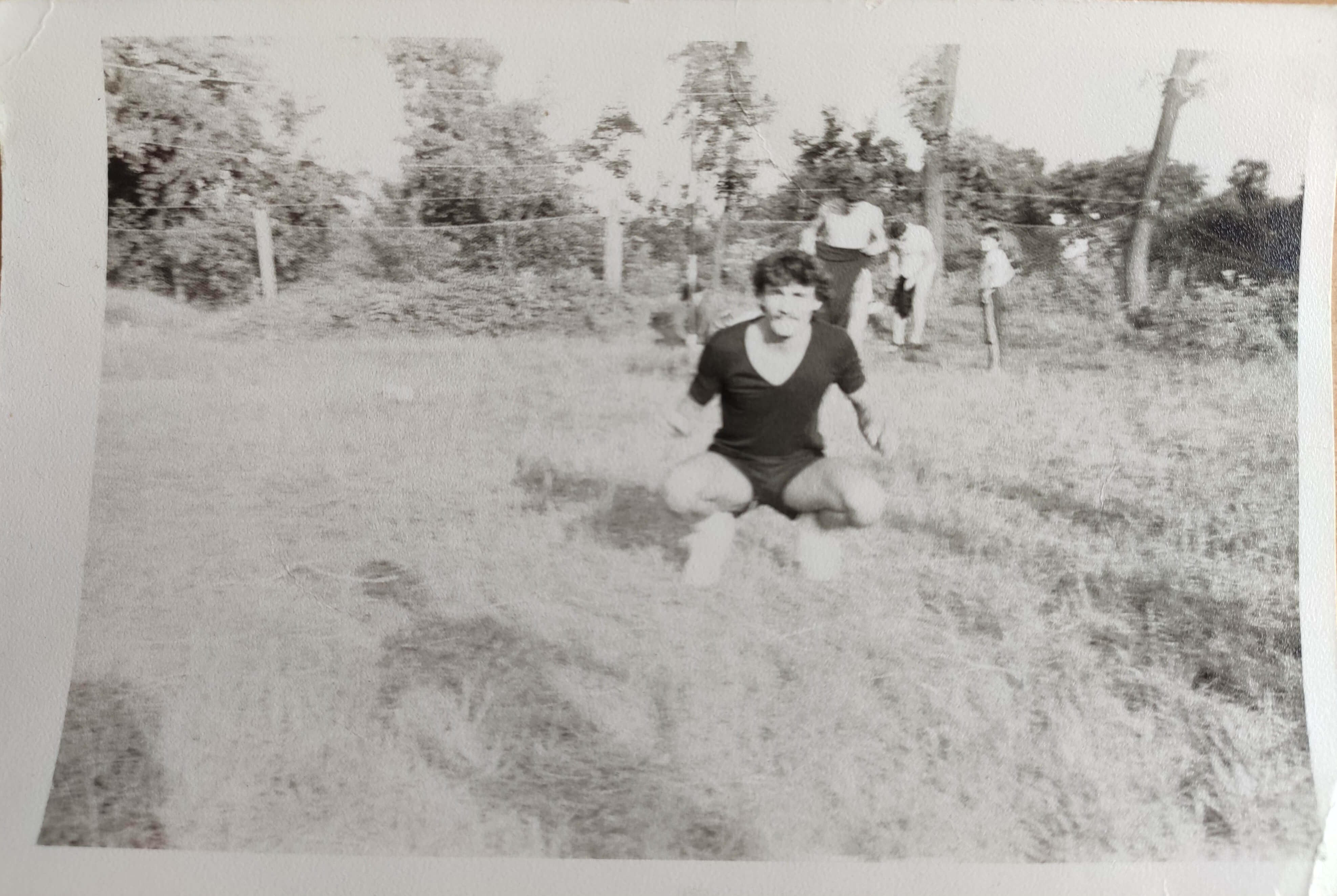
My father preparing for the football tournament in the early 70s, Private album/Dora Naletilić
According to Bijelić (2008) and his article The Beginning of Playing Football in Đakovo, “it was started by students who, over summer school holidays, stayed in the cities that did not abound that much entertainment for young people. Sports, or in this case, football, was supposed to enrich the social life of the place, expand the possibilities of creative expression and in socially acceptable way articulate the accumulated youthful energy.” There weren’t dressing rooms where participants could get changed in sports gear or leave their personal stuff. It was an open meadow with no shade, exposed from all angles. However, that did not stop anyone, they just wanted to play football.
Growing up in a Slavonian village during the 90s and 00s had its pros and cons but the biggest advantage was definitely sports tournaments that took place during summer school holidays. The anticipation could always be felt near the end of the school semester. Teams participating would be revealed and speculation would begin: Who is playing for which team? Who is leading them? Our neighbour? Someone’s brother? Sister? Cousin? Some guy from another village who was a professional athlete? It seems silly to the outsiders but for us, it was a highlight of the year. It started with Municipality Day, a village fair celebrating a local saint (in this case St. John the Baptist), an amusement park that entertained kids during the day and it continued until the evening when the summer tournament was about to start. It didn’t have a particularly fancy venue; a playing field made out of concrete suited for handball and bleachers which were made out of the same material. Nothing special. Until it was.
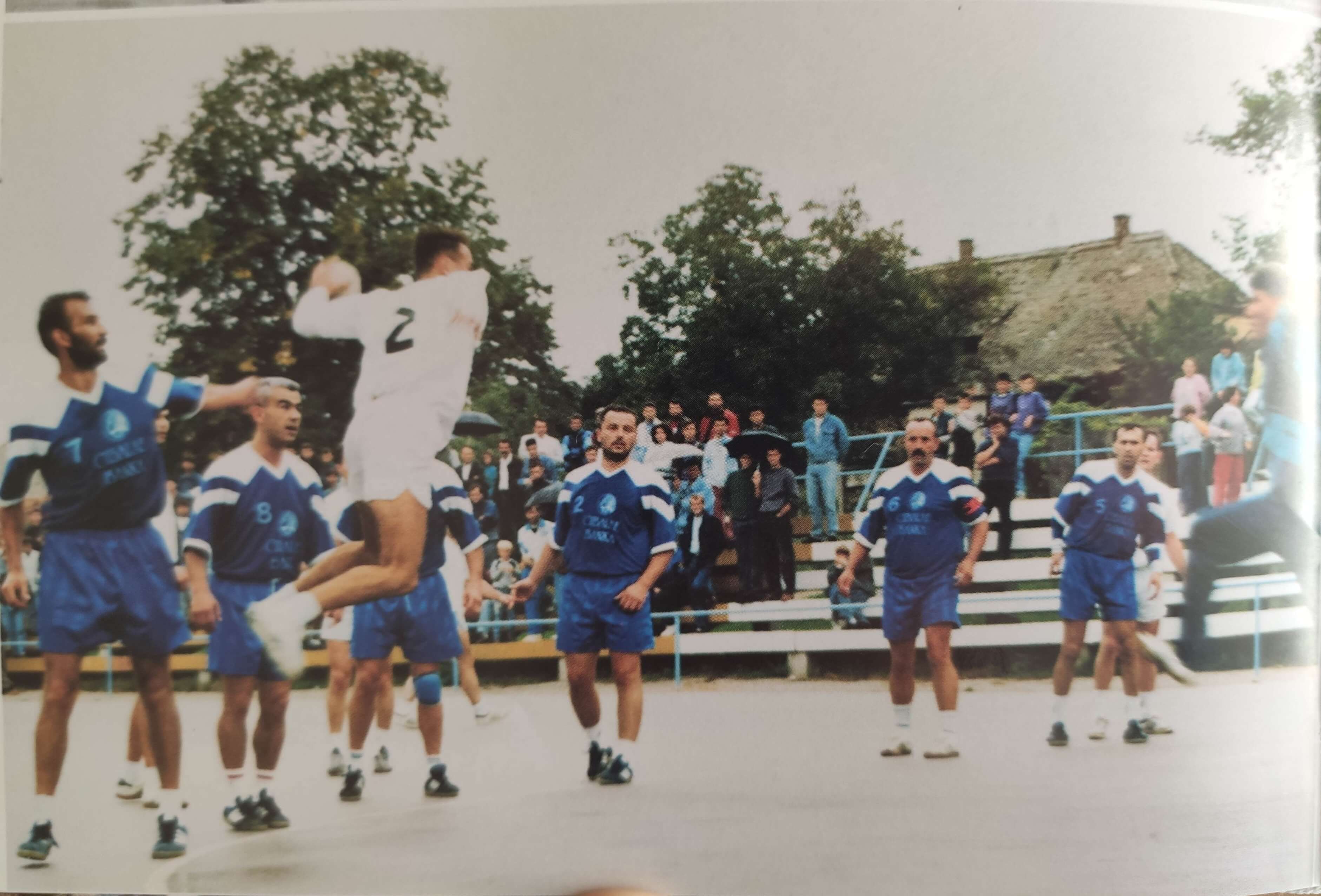
An old concrete field that was used for handball and football in the late 80s, "Rukometni klub u Ivankovu 1966 - 2016" book by Handball club "Cestorad" Ivankovo
The organization consisted of three main segments: the staff that kept the score and records of participants, sponsors of the venue, and of course snack bars, which were filled with local cuisine. When that was settled, the tournament could begin. The whole village of Ivankovo would participate in the event and support their own favorite teams. The supporting crowd would take out their own sirens that firefighters would use in their interventions and the atmosphere would seem like there was a huge national football cup game going on. Parents would drink their beers and nibble the seeds with their children, while the older folks would loudly comment on everything happening on the field. It was a picture-perfect small-town atmosphere that we (now young adults) think fondly of.
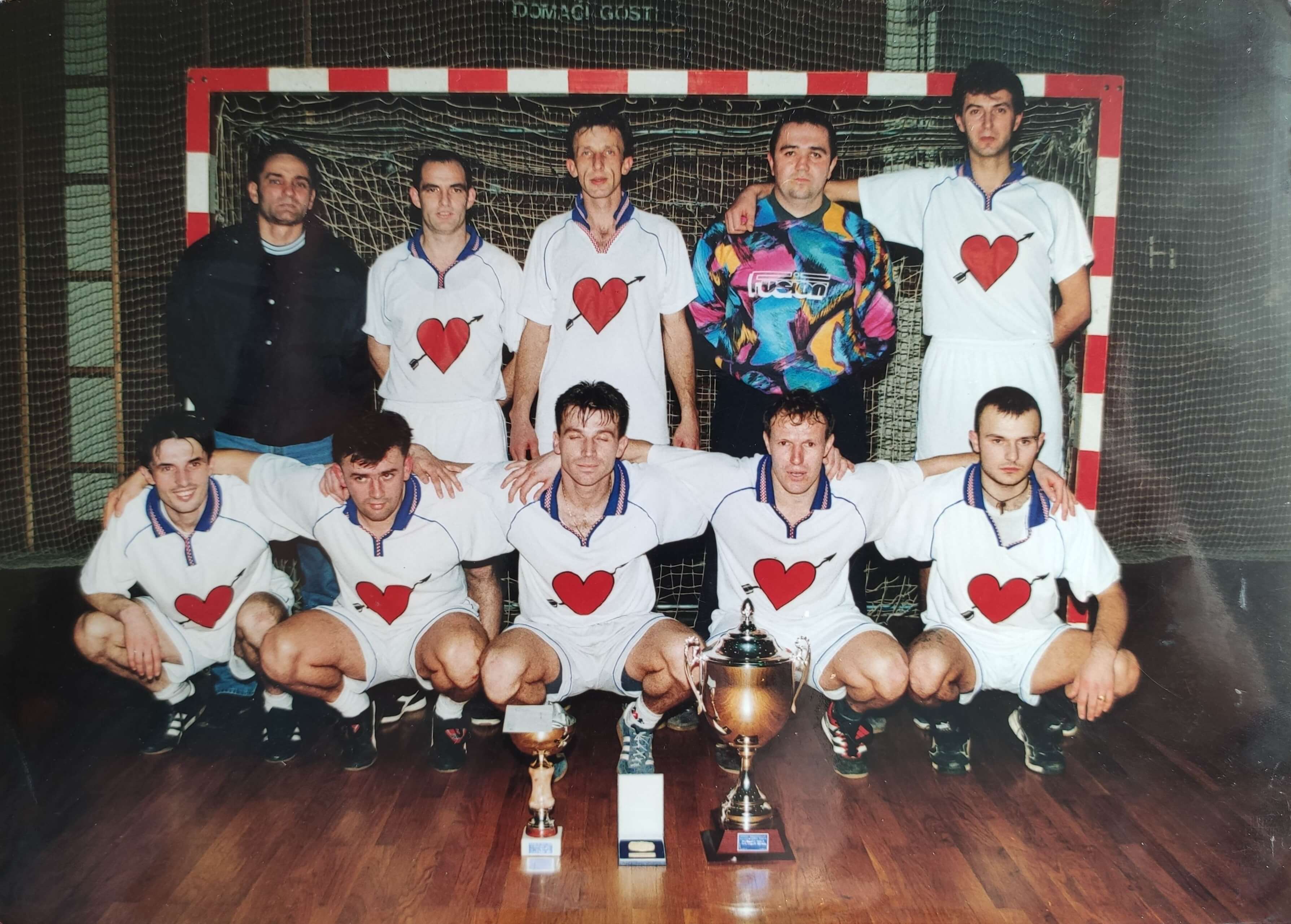
"Lutajuća srca" after winning the summer tournament, the early 2000s, Private photo album/Dora Naletilić
Looking through the old photos reminded me why I started loving sport in the first place. My father was constantly participating in villages sports tournaments, mostly football ones, where he would have his own team competing for the title of the best in the village. His team was called “Lutajuća srca” (Wandering hearts) and has won multiple tournaments over the years. One of the best feelings in my life was carrying that trophy across the field after excruciating penalties and the sound of the fellow villagers clapping and cheering.
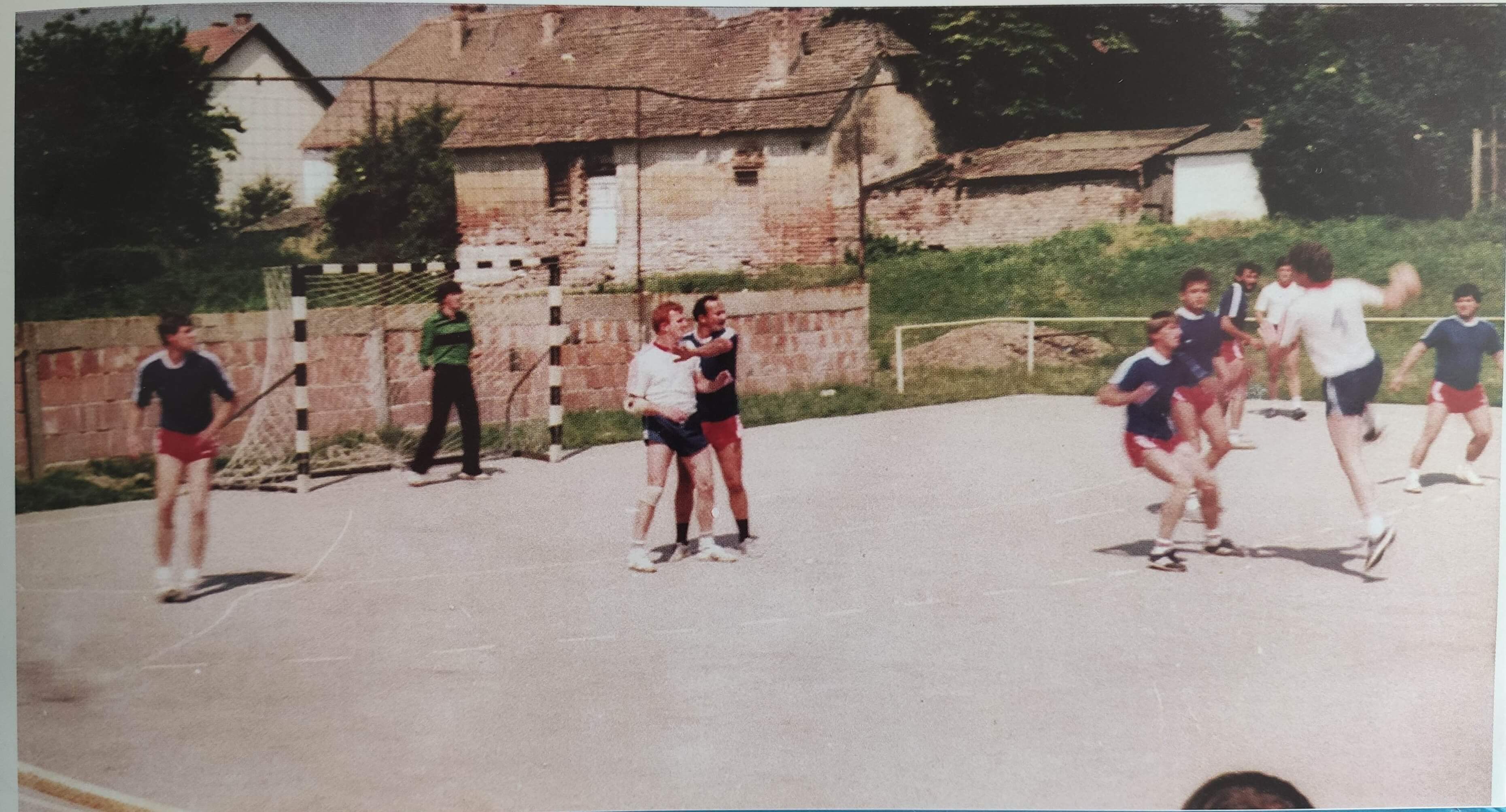
Old handball tournaments in 1986, "Rukometni klub u Ivankovu 1966 - 2016" book by Handball club "Cestorad" Ivankovo
Football wasn’t the only sport Ivankovo had to offer, handball always had and still has a big impact on sports fauna in this part of Slavonia. When the sports arena in Ivankovo was built, children and senior players finally had a venue where they could play their league games. After the mass, every Sunday morning people would go to the games and root for their team. Generations of families were always part of sports teams (including my brothers) and it stayed like that even today.
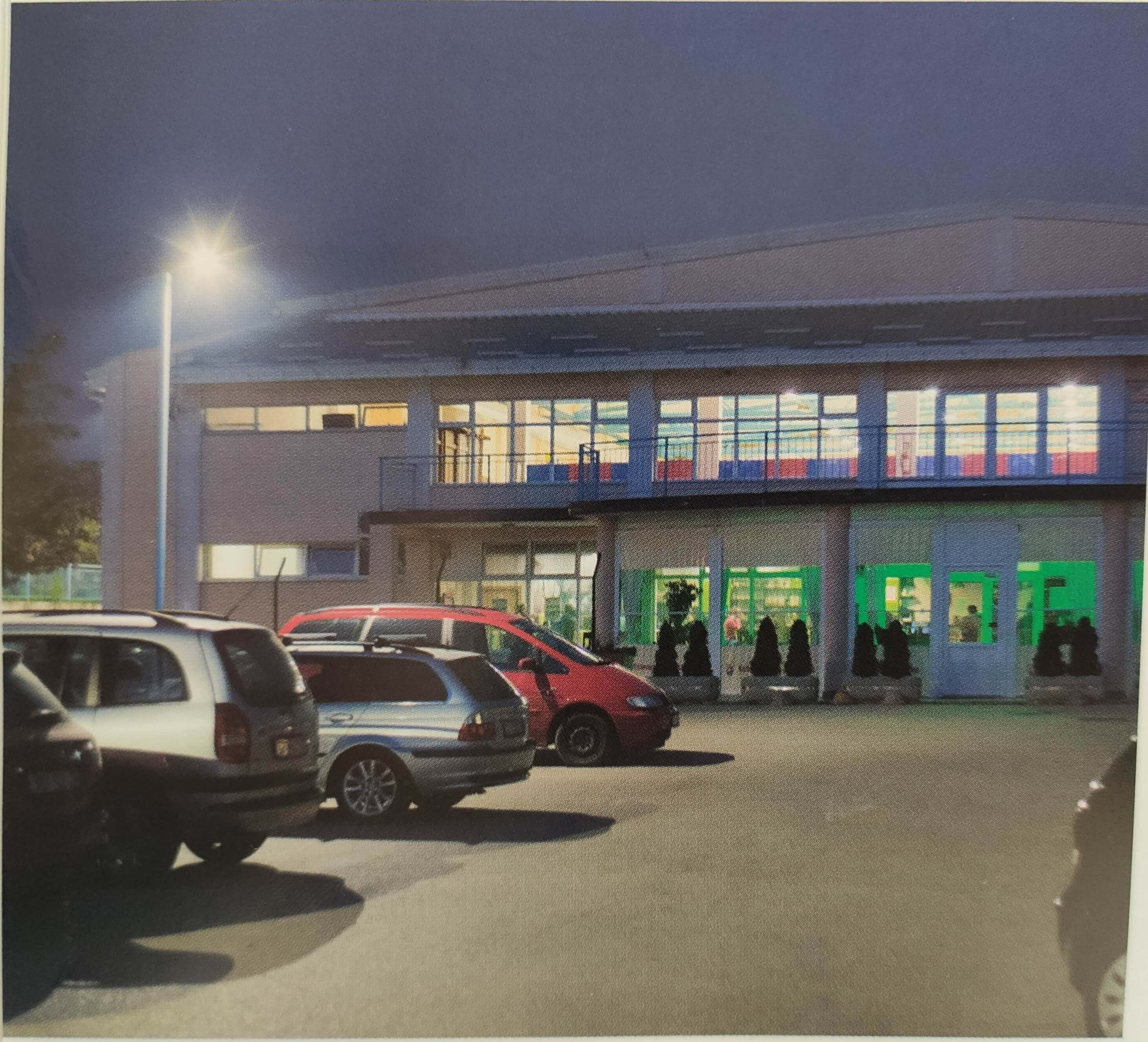
Sports arena opened in 2008, "Rukometni klub u Ivankovu 1966 - 2016" book by Handball club "Cestorad" Ivankovo
The annual summer tournament in Ivankovo maybe doesn’t have that charm it had 20-30 years ago but it’s still happening to this day. Sports games as a part of the “Summer in Ivankovo” are still going strong with other surrounding villages having their own traditional events. This only just shows that nothing in this country is taken for granted; if we love it, then we truly love it with all our hearts and souls. Sport is not just entertainment here, it’s the way of life. 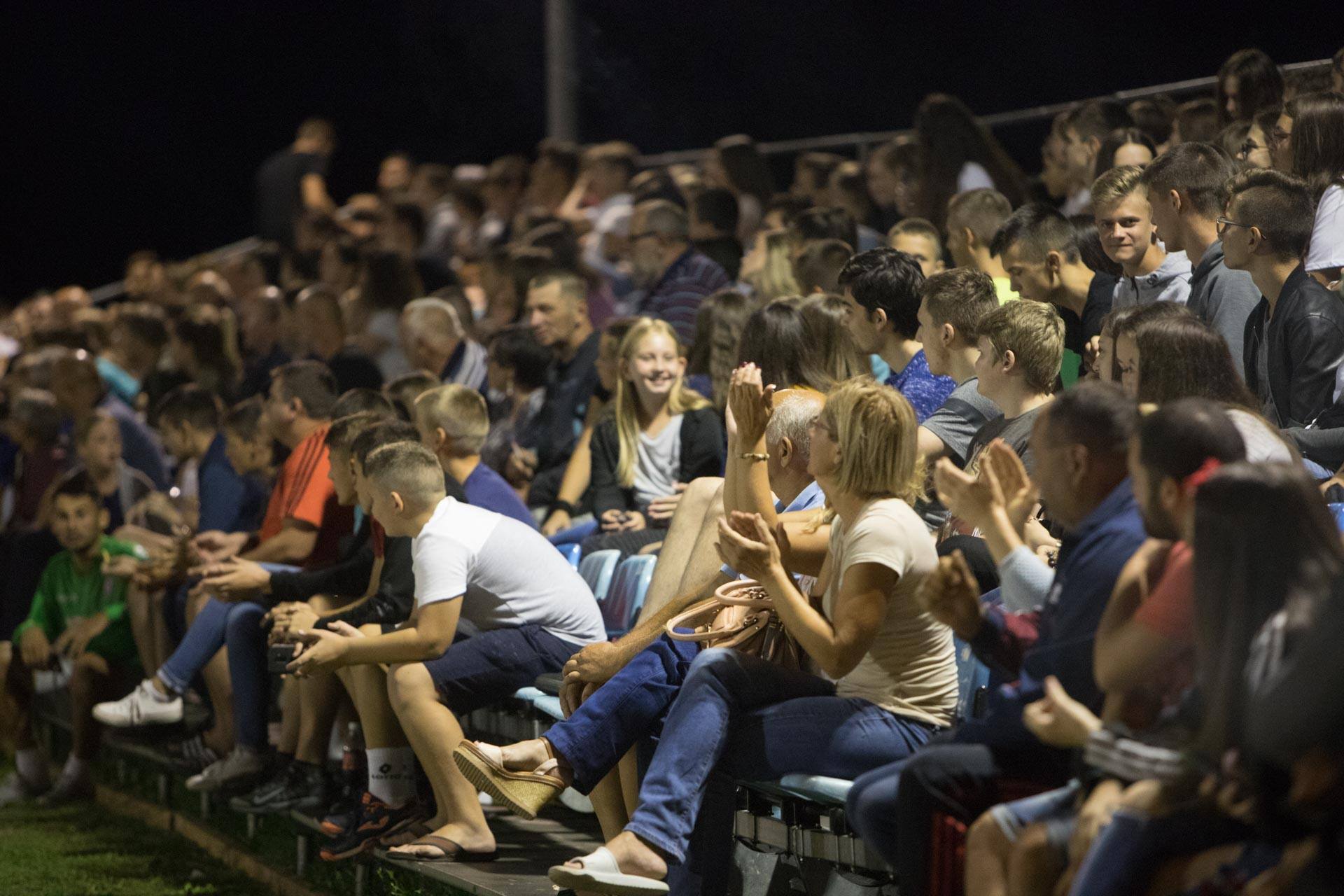
The crowd at a sports event during "Summer in Ivankovo", photo credit: Ivankovo.info
To read more about sport in Croatia, follow TCN’s dedicated page.
Croatia Reports 6,220 New Coronavirus Cases, 46 Deaths
ZAGREB, 30 Jan 2022 - In the past 24 hours, 6,220 new coronavirus infections were detected out of 13,062 PCR tests, while 46 related deaths have been confirmed in Croatia, the national COVID-19 crisis management team said on Sunday.
There are 2,008 hospitalized patients, including 185 on ventilators, while 38,731 persons are self-isolating.
To date, 56.53% of the population has been vaccinated. This includes 67.72% of all adults, of which 64.82% are fully vaccinated.
For all you need to know about coronavirus specific to Croatia, make sure to bookmark our dedicated section and select your preferred language if it isn't English.
Milanović: "Dumb" Grlić Radman Officially Invited Putin to Croatia
ZAGREB, 29 Jan 2022 - Croatian President Zoran Milanović said on Friday that Foreign Minister Gordan Grlić Radman had officially invited Russian President Vladimir Putin to Croatia, but not on his behalf.
During a visit to Sisak, Milanović was answering questions from the press concerning accusations from the ruling HDZ party that he had pro-Russian views and that his statements caused harm to Croatia's reputation.
"The dumb foreign minister visited Moscow the other day," Milanović said in reference to Grlić Radman's official visit to Russia on 17 January.
"What was he doing in Moscow? I would expect he went to reproach (Russian Foreign Minister Sergey) Lavrov, but no, he goes there and hands in an official invitation for Putin to visit Croatia."
"Is he the president of the state? Does he speak on my behalf? He does not. (PM Andrej) Plenković is not the head of state and cannot play host to Putin," said Milanović.
"So the very same Russians that you threaten and stigmatise you hypocritically invite to Croatia," Milanović said.
The president denied having been the one to speculate that Croatian troops would go to Ukraine.
"No, it was Jutarnji List (daily) that did it, saying on its front page that NATO is looking for 1,500 soldiers" and asking if Croatia would send them, Milanović said.
"And what is that but alarming the public?"
"I never said that NATO had asked for that, I said preemptively that Croatia would not send its troops."
"Croatia will not send troops to Ukraine, and as for Poland and Lithuania, we'll see in the future," Milanović said, adding that HDZ officials did not know what they were saying, did not listen to what was said, and did not read the newspaper "that is the long arm and prosthetic device of the Plenković government."
Croatia was not liberated by NATO
Milanović went on to say that Hanza Media, the company that publishes Jutarnji List, scared the public by saying that 1,500 Croatian troops would go to Ukraine.
"Someone had to tell the public that that is a lie, so I said it."
Speaking of the situation in eastern Europe and possible deployment of troops along Ukraine's eastern border, Milanović said that Croatia would not promise anything to anyone unconditionally.
"That's not credibility, that's lack of intelligence. We'll see what happens. If the situation escalates, our people will not expose themselves to the risk," Milanović said, adding that ultimately, the decision was up to him.
"Either that or the two-thirds majority in the parliament, and that will never happen because people have a brain in their head and care for this country, unlike the HDZ, which only steals, insults and disgraces," said Milanović.
"Croatia has not been asked anything yet, and should not be," he said, repeating that Croatian troops would not be sent to Ukraine.
"If things get more complicated, the army will not go anywhere. They will be in Kosovo and in Croatia. Croatia paid too high a price and nobody helped it significantly in its struggle. Croatia was not liberated by NATO but by Croatian soldiers."
"Croatia does not owe anyone anything to have to gamble and for (Croatians) to be sheep for slaughter," Milanović said, recommending that his critics go to Ukraine.
For more, check out our politics section.
HDZ MEP Says Milanović's Statements Cause Great Harm to Croatia
ZAGREB, 29 Jan 2022 - President Zoran Milanović's statements about Croatian troops' deployment on the eastern borders of the EU are nonsense that causes great harm to Croatia, European Parliament member Tomislav Sokol of the ruling HDZ party said on Saturday, presenting his party's view.
Asked by reporters if Croatian troops would be deployed on the EU's eastern borders, Sokol said that that was a falsehood made up by Milanović.
"It is being alleged that Croatian soldiers will get killed for somebody. What (Milanović) is saying is a complete fabrication. Such statements cause serious harm to Croatia," Sokol said after a convention of the HDZ women's association "Katarina Zrinski".
Sokol said that Croatia supported de-escalation of the Ukraine crisis and that deployment of Croatian troops had never been mentioned.
Earlier this week, Milanović said that Croatia had nothing to do with the conflict in Ukraine and that if the crisis there escalated, there would be no Croatian soldiers in that scenario.
"Croatia has always been in favour of respect for Ukraine's territorial integrity and for a solution to be found peacefully. This is just one more way to attack the government and harm Croatia's international reputation," said Sokol.
Commenting on Milanović's remark that Plenković was acting like a Ukrainian agent, HDZ MP Mario Kapulica said that he was wondering whose agent Milanović was.
Milanović said in an interview with the RTL broadcaster on Friday that he was neither an enemy of Ukraine nor a friend of Russia, but that EU reports showed that the former Soviet republic was a corrupt country, noting that PM Andrej Plenković was acting like a "Ukrainian agent".
Kapulica said that Milanović could not define Croatia's foreign policy on his own and that the period of adaptation to his style of communication was over.
"This current situation is much more serious and much more dangerous... he wants to make Croatia's position as one having nothing to do with either Europe's or NATO's," Kapulica said.
For more, check out our politics section.
Petrov Says Government Will Do Anything to Avoid Referendum on COVID Certificates
ZAGREB, 29 Jan 2022 - Opposition Bridge party leader Božo Petrov said on Saturday the government would do anything to avoid a referendum on the constitutionality of COVID certificates, noting that it was not clear to him why the government was afraid of "its people" and its opinion.
"400,000 people gave their signatures in impossible conditions and a clear message was sent to the government and the Constitutional Court that they should not play with the people's will and that they should let the referendum happen. If they intend to stall, it will backfire on them, because this time people will not forget it," Petrov told reporters in Pazin, where a branch of the Bridge party was established.
Commenting on President Zoran Milanović's statement of Friday that the incumbent government was the most corrupt government Croatia has ever had and that the prime minister is protecting his corrupt associates, Petrov said that it was a fact the government had not done anything to rid the state of corruption.
"It is a fact that they opted to keep the Attorney General who was recently found to have protected a corrupt government minister and who shelved her case without having either dismissed or opened it. It literally took a European prosecutor to show what has to be done," Petrov said, adding that "the state does not work in people's interest."
He noted that topics other than the relationship between the president and the prime minister were much more important at present.
"Inflation, a serious price growth, 20% of people are on the brink of poverty. Given the coronavirus crisis and inflation, the situation can only get worse and I would like the president and the prime minister to deal with that," Petrov said, pointing to lack of any progress in the post-earthquake reconstruction of Zagreb and Sisak-Moslavina County.
After 62 opposition MPs collected signatures for a motion to have Construction Minister Darko Horvat replaced, Petrov said that it was only normal the ruling HDZ party, which holds the majority in the parliament, would reject the motion but that that did not mean that its decision was right.
"I would be ashamed if I had to defend the minister in the parliament, even if he were my brother, I would tell him not to embarrass himself and to step down," he said.
Homeland Movement Leader: This Year's Sowing to be Most Expensive Ever
ZAGREB, 29 Jan 2022 - Homeland Movement (DP) leader Ivan Penava said in Osijek on Saturday that this year's sowing in Croatia would be the most expensive ever and that it would result in the collapse of the national farm sector and citizens' living standards.
"The government is ignoring the problem and is late in responding," Penava told a news conference.
A member of the DP Agriculture Committee, Darko Dimić, said that the coming pre-sowing fertilisation would be a number of times more expensive than last year.
Talks with farmers have shown that they will reduce the use of artificial fertilisers by 25-50%, which will result in a drop in yields and their quality, Dimić said.
Asked by reporters to comment on an increase in the number of deaths in 2021 in relation to the 2015-2019 average, Penava said the incumbent government did not concern itself with demography just as previous governments had not.
As for a reporter's remark that Vukovar and Vukovar-Srijem County had lost the largest number of residents, according to preliminary results of the 2021 census, Penava said that it was true when one spoke about relative percentages but that Osijek-Baranja County was the one to have lost the largest number of inhabitants.
"I have been saying for ten years that Vukovar does not have 27,000 inhabitants, which is the number from 2011, but 22,000. This census will prove that we were right and that the number was exaggerated," Penava said, noting that Serbs did not account for almost 35% of Vukovar's population.
"I have been saying for years that the only one who benefits from that percentage is the Independent Democratic Serb Party (SDSS), because the number of its councillors (in the Vukovar city council) and its income from the city budget as well as its other rights depend on it," said Penava, who is also Mayor of Vukovar.
Croatia's Coronavirus Update: 15,416 Cases, 41 Deaths, 10,462 Recoveries
ZAGREB, 29 Jan 2022 - In the last 24 hours, PCR tests have detected 9,904 new cases of the infection with coronavirus plus 5,512 cases detected by rapid antigene tests, Croatia's COVID-19 crisis management team reported on Saturday.
The COVID-related death toll has increased by 41 to 13,731.
There are currently 66,152 active cases of infection with SARS-CoV-2 in the country. Of them, 1,936 are hospitalized patients, including 183 placed on ventilators.
Since the first registered case of the infection with the novel virus in late February 2020, so far, 929,502 cases of the infection have been detected, and of them, 849,619 people have recovered, including 10,462 recoveries in the last 24 hours.
To date, 64.79% of adult Croatians have fully been vaccinated against this infectious disease.
For all you need to know about coronavirus specific to Croatia, make sure to bookmark our dedicated section and select your preferred language if it isn't English.
MEP: Milanović's Statement for Internal Face-off, But Damage is in Foreign Affairs
ZAGREB, 29 Jan 2022 - Although President Zoran Milanović's statements on Ukraine, EU, NATO, and Russia were intended for his face-off with Prime Minister Andrej Plenković in the home policy, they have done damage to Croatia's credibility in the global affairs, Member of European Parliament, Tonino Picula, says.
The Croatian MEP said in an interview with Hina before his departure for Ukraine at the helm of the European Parliament's delegation, that he could see Milanovć's claims about Ukraine not belonging in NATO and his understanding for Russia's arguments in the Russia-Ukraine crisis "as his statements serving primarily the purpose of his conflicts on the internal policy scene."
The president and the premier are so deep in the conflict that some of the topics that are supposed to reflect a minimum of state unity such as foreign affairs topics have also fallen victim to that conflict, the Croatian MEP told Hina.
Last Tuesday, Milanović said that Croatia would not have a military presence in Ukraine in the event of a Russian invasion, that the events in Ukraine of 2014, known as the Revolution of Dignity, were a military coup, that Europe had not done enough to assist Kyiv, and that the tensions on the Ukraine-Russia border were a consequence of the US home policy. "All that is happening in the antechamber of Russia. One must reach a deal that will take account of the security interests of Russia," said Milanović then.
Picula said that at the moment no one is considering the deployment of NATO's troops in Ukraine.
"I am against the policy that undermines the credibility of Croatia as a member of the European Union and of NATO. Milanović's pro-Russian attitudes undermine that credibility and I also hold that PM Plenković, too, undermines Croatia's credibility primarily through toleration of corruption in his own ranks."
Picula calls on the head of state and the head of government to refrain from spilling their conflicts over to foreign affairs.
"This story should be closed as soon as possible. Croatia needs definitely a higher degree of consent between top leaders for the sake of its credibility abroad," said Picula who was the foreign minister in the coalition government led by Prime Minister Ivica Račan of the SDP party in the early 2000s.
Ukraine crisis exposes weaknesses of EU
While Kyiv and Western countries are bracing themselves for a potential invasion of Russia along its border with Ukraine, where Russian troops are being amassed, Moscow refutes claims that it is preparing attacks on its southwestern neighbour, and insists that the West provides it with guarantees that NATO will not be expanded further eastwards.
On Sunday, the eight-member EP delegation, which includes Picula, is set to fly to Ukraine to meet the Ukrainian leadership.
In the European Parliament, there are different views on the Ukrainian crisis.
Picula said that a majority of the MEPs express solidarity with Ukraine, and support the respect for that country's sovereignty and right to choose which associations it would like to join.
Different approaches of the EU member states to the response to the Russia-Ukraine crisis have an effect on the EU's political strength, he said.
"This crisis also exposes the EU being stuck halfway in its integrations, and this half of unfinished integrations prevents the Union from responding to ad hoc crises, notably when they are external shocks."
The Ukrainian crisis also juxtaposes much wider geopolitical interests, he said adding that Russian President Vladimir Putin would like to avoid EU leaders in efforts to settle the current crisis.
"He wants to talk with the Americans and not with EU leaders, and this is part of his strategy to disintegrate the West."
On the other hand, he does not refrain from holding talks with the economic establishment of the EU and reminding them of the benefits of the Russian-European cooperation, Picula said.
Granting Russia's maximum demands such as that Ukraine should not join the EU or NATO and that NATO should pull out of eastern countries would mean that the European project is abandoned, said the Croatian MEP.
He says he cannot accept the arguments of Moscow that it could feel threatened in the event of the further eastbound expansion of NATO.
"Although Russia's fears about an invasion from Europe have their roots in the past, also the east of Europe has the historically rooted fears of Russian invasion," Picula told Hina in the interview published on Saturday.
For more, check out our politics section.
52,000 Croats Earn Minimum Wage
ZAGREB, 29 Jan 2022 - An estimated 52,000 employed Croatians receive the minimum wage, and roughly 20,000 of them are workers in the wood-processing, leather, and textile industry.
In terms of the minimum wage for January 2022, Croatia ranked 21st, with €624, on the list of the 27 EU member-states. The other four countries at the bottom of the ranking were Hungary (€542), Romania (€515), Latvia (€500) and Bulgaria (€332), Večernji List (VL) reported on Saturday.
In 2022, the minimum wage was raised from HRK 3,400 to the net monthly amount of HRK 3,750 and the gross amount of 4,700, the daily newspaper recalled. In late October 2021, the parliament amended the Minimum Wage Act by majority vote whereby the gross minimum wage was raised to HRK 4,687 from HRK 4,250. As of this year, employers will have to contract the minimum wage with employees in the gross amount.
The daily newspaper says that in December 2021, one in ten employees got the take-home pay in the amount of HRK 3,915, or his or her gross wage was below HRK 4,772. Slightly over 1.57 million people in Croatia were in employment in December 2021, according to the data provided by the national statistical office, which means that 3.3% of them were on the minimum wage (HRK 3,750)
In December, the average take-home wage was HRK 7,333 (€978), and in 2022, this monthly average is expected to finally exceed 1,000 euros.
In 2022, the minimum wage will for the first time exceed 50% of the average wage, while five years ago it was equivalent to a mere 38% of the average monthly salary.
(€1= HRK 7.5)
For more, check out our dedicated business section.


